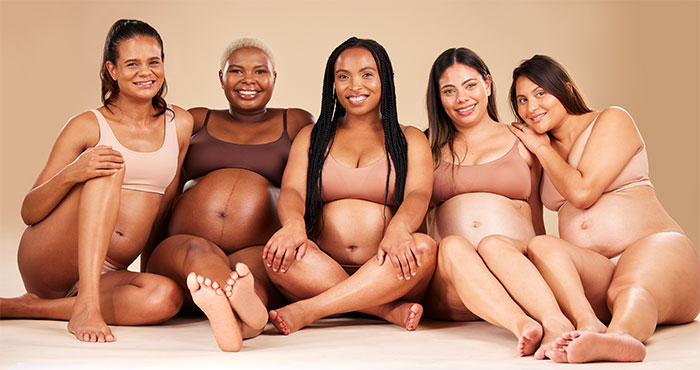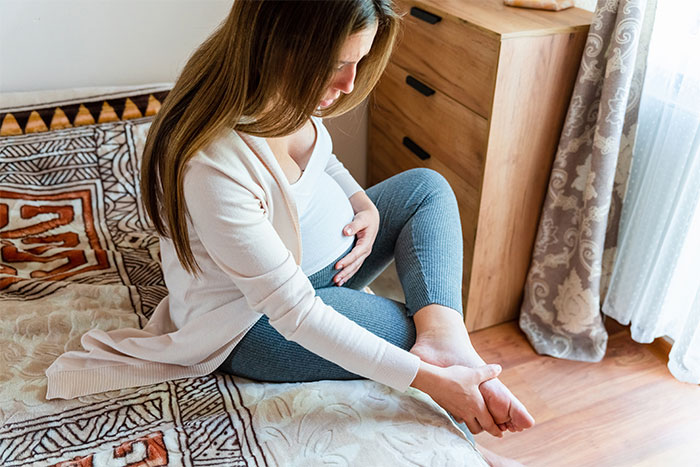Phone: +44 (0)20 8492 1600
Need help or have a question?
Contact us at: [email protected]
| Section | Description |
|---|---|
| Pregnancy Foot Care | Discusses the physiological changes a pregnant woman may experience in her feet and why foot care is crucial during pregnancy. |
| Common Foot Problems | Examines common foot conditions during pregnancy such as swelling, overpronation, and leg cramps. |
| Foot Care Tips | Provides helpful advice on footwear, exercises, hydration, and dietary habits for pregnant women. |
| When to Seek Help | Details when a woman should seek medical advice for persistent foot pain, severe swelling, and signs of deep vein thrombosis. |
| FAQ Section | Answers common queries regarding foot care during pregnancy, including foot swelling, wearing heels, foot massages, and products for foot care. |
Pregnancy entails major body changes, not least of which occur in your feet due to weight gain, hormonal shifts, and fluid retention. Looking after your feet during this time is key to your overall well-being, comfort, and mobility. In this guide, we delve into common foot problems during pregnancy, the importance of foot care, and practical tips for optimal foot health.
Caring for your feet during pregnancy involves more than comfort—it’s about maintaining balance, mobility, and staving off complications arising from extra weight and hormonal changes. Consider adding foot care products such as our Super Sport Arch & Heel Support into your regiment to enhance comfort and prevent potential problems. The changes you experience during pregnancy can also impact foot structure, leading to problems like overpronation (flat feet). Use supportive products such as our Bunion Pads and Bunion Protector to alleviate common pregnancy-related foot issues.
While foot health during pregnancy might seem minor compared to other prenatal concerns, neglecting it can lead to discomfort and long-term complications. Proper foot care, including the excercises below and the products we highlighted above as well as Corn Wraps or our Corn Wraps XL, can help to greatly enhancing your overall comfort during pregnancy.

As we mentioned in the introduction pregnancy triggers a series of physical changes, including several that can affect your feet. Understanding these changes can help you manage discomfort and prevent potential complications. Here, we delve into some common foot problems many women face during pregnancy.
Swelling, or edema, is a common condition during pregnancy, particularly in the feet and ankles. This is due to the increased body fluid and blood volume necessary to nurture your developing baby. Edema can cause discomfort, tightness, and a heavy sensation in the feet. The swelling can become more pronounced by the end of the day and in warm weather. Although mild foot and ankle swelling is normal, sudden or excessive swelling could be a sign of preeclampsia, a serious condition that requires immediate medical attention.
Overpronation, also known as flat feet, can become a concern during pregnancy. This is when your arch flattens out when bearing weight, causing the feet to roll inward excessively when walking. Pregnancy weight gain, coupled with the loosening of ligaments due to hormonal changes, can exacerbate this condition. Overpronation can lead to foot, ankle, and hip discomfort and can alter your balance, making it crucial to manage. Comfortable, supportive footwear, and specially designed insoles can help provide the necessary support and relieve discomfort.
Many pregnant women experience painful leg cramps, often at night. While the exact cause isn’t known, it might be due to the extra weight carried during pregnancy. Or potentially due to dietary factors like a lack of magnesium or calcium. Regular, gentle exercise and stretching can help prevent cramps.
Varicose veins are another common issue during pregnancy. Increased blood volume and pressure on the large vein on the right side of the body can lead to enlarged veins, typically in the legs. While varicose veins pose minimal health risk, they can be uncomfortable and aesthetically displeasing for some. Compression socks and regular exercise can help manage symptoms.
Taking care of your feet during pregnancy is crucial not only for comfort but also for maintaining balance and mobility. Here are some practical and effective tips to help you take care of your feet during this important phase of life.
Regular exercise can promote circulation, ease swelling, and maintain overall foot health. Simple, low-impact exercises such as walking and swimming are ideal. Additionally, stretching exercises can provide relief from foot discomfort. For instance, sitting with your legs extended, flex and point your toes back and forth 10 times. This can help to stretch your calf muscles and mitigate cramping. Always consult with your make sure to consult your doctor/GP or midwife straight away before starting any new exercise regimen during pregnancy.
Elevating your feet can help reduce swelling, particularly in the latter stages of pregnancy. Whenever possible, try to elevate your feet above the level of your heart. This can be done by lying down and propping your feet up on pillows. Ideally, you should aim to elevate your feet for around 15-20 minutes, several times a day. However, always listen to your body and elevate your feet whenever you feel it’s necessary.
Proper hydration and a balanced diet are important for overall health, including your feet. Drink plenty of fluids to help mitigate foot and ankle swelling. A diet rich in potassium (found in foods like bananas and sweet potatoes) can also help reduce fluid retention. In addition, adequate calcium and Vitamin D intake is necessary to prevent leg cramps and promote bone health. Omega-3 fatty acids found in fish, flaxseeds, and walnuts can also help manage inflammation and promote overall foot health. Always consult with make sure to consult your doctor, midwife or a nutritionist for personalised dietary advice during pregnancy.
Wearing the right footwear during pregnancy is vital. As your feet might swell and your center of gravity changes, you should opt for shoes that are comfortable, supportive, and have a non-slip sole. Footwear with a wide toe box will accommodate foot expansion and avoid pinching. Avoid high heels as they can exacerbate the risk of falls and put unnecessary pressure on your feet. Instead, choose flats or shoes with a low, stable heel. Always try shoes on in the afternoon when feet are at their largest due to natural swelling throughout the day. You should also use cushioning insoles, 3/4 length insoles or heel cushions to reduce the pressure on your feet and knees.

Some foot discomfort is common during pregnancy, but it’s crucial not to ignore persistent or severe symptoms. If your foot discomfort continues, becomes unbearable, or is accompanied by other worrisome symptoms, make sure to consult your doctor/GP or midwife straight away.
Foot care during pregnancy may seem like a small part of overall prenatal care, but it significantly impacts comfort, health, and your pregnancy experience. With the right care and products, you can experience pregnancy with happier feet, making each step toward motherhood more comfortable.
Foot swelling, also known as edema, is common during pregnancy due to increased fluid volume in the body and pressure from the growing uterus on the veins. It can be reduced by wearing comfortable shoes, keeping the feet elevated whenever possible, staying active to promote blood circulation, and hydrating well.
While most foot problems during pregnancy are common and usually not a cause for concern, some can signal a more serious condition. For instance, sudden or severe swelling could be a sign of preeclampsia, a condition that can be dangerous if not treated promptly.
If you find that home remedies are not helping to ease your foot discomfort, it might be time to see your Doctor or midwife. They can offer tailored advice and treatment options based on your specific symptoms.